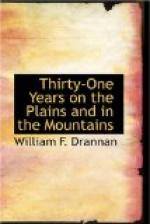We mounted our horses and rode in the opposite direction, but before we left we gave a yelp in a laughing sort of manner to make the Indians believe that we thought it was cayotes. We rode quietly away about three hundred yards from the fire, dismounted, tied our horses and crawled back near the fire. All this time the Indians had kept up their cayote barking and were drawing near the fire. It was some little time before they dared approach, but after they had looked carefully around, I suppose they thought it had been campers who had stopped, built a fire and then pulled out, for it was not the custom of scouts to build a fire, which the Indians well knew, they finally ventured up to the fire and were warming themselves. Seeing that they were both armed with rifles, and the chances were they both had pistols, we made up our minds not to take any chances, so I proposed to George that we should shoot them down, just as they would have done us if we had not understood their signal.
Of course if it had been daylight it would have been quite different, but three jumps away from the fire and they would have been safe from us. We were sitting side by side not more than forty yards from them. I told George to take the one on the right and I would take the one on the left, and when he gave the word I would fire with him. We raised our guns, and when he gave the word we both fired, and the two Indians fell to the ground. We waited about five minutes to see whether they would rise or not, and believing we had killed them both, we approached them. One of them was dead and the other was just about dead, so we took their guns and pistols and reported to Gen. Wheaton.
The next morning he said it was a mystery how the Indians would get out and the men on picket would not see them. He said: “I cannot see through it.”
About a week or ten days later George and I were coming in just before daylight, when we heard a baby cry on the hillside only a short distance from us. We stopped and listed until we had located it. George dismounted, and I held his horse while he crawled up to see where it was, and found that there was quite a number of squaws and children there. I told him that it would be a matter of impossibility for them to get away from us and the grass so high, for we could track them easily, so I left him there to keep watch and see which way they moved so that we would know how to start after them, and I would ride to headquarters, about two miles away, for assistance to help capture them when it was daylight. I rode slow until so far away that I knew they could not hear the clatter of my horse’s feet, and then I put spurs to my horse and rode with all speed to headquarters. When I passed the camp guard he challenged me and I gave my name. I could hear it carried down the line from one to another, “There comes the Captain of the Scouts, there is something up.” Rather than wake up a commissioned officer, I woke up my entire scout force, and was back




